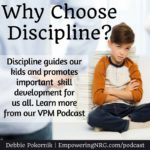Podcast 011 - Discipline; Part 1
Today we are going to talk about the difference between discipline and punishment.
Lots of people use these two words interchangeably when in fact they are quite different. I'm not concerned about the misuse of the words as much as I want people (parents especially) to clearly understand the difference so they can make an educated choice about how they want to proceed in life.
This is an important topic to be aware of because discipline of others is tightly tied to self-discipline – this is what helps you live a healthy life, treat others in ways you would like to be treated, to respect others property, to build strong relationships and so much more.
Most of us have been raised using a punitive style, so that is what we have internalized. This means, that if we stay on autopilot, we will quite naturally use this style, even when we don't want to. Not just with our kids, but with our friends, colleagues, life partners and so on.
Intuitively we know that threats, hitting, incarceration, etc, do not bring out the best in people, but we aren't always  aware of how to do it differently. This robs you of your vibrancy and power, because it can make you behave in inconsistent and contradictory ways. This can put you on the defensive (making you dig deep to justify actions that you don't even really believe in) or shrink inwards and allow feelings like guilt or embarrassment to run the show. We are definitely not at our best when we let those feelings take over.
aware of how to do it differently. This robs you of your vibrancy and power, because it can make you behave in inconsistent and contradictory ways. This can put you on the defensive (making you dig deep to justify actions that you don't even really believe in) or shrink inwards and allow feelings like guilt or embarrassment to run the show. We are definitely not at our best when we let those feelings take over.
This topic is relevant to everyone, but since my podcast is called Vibrant, Powerful Moms, I'm going to look at it mostly from the parenting angle. Whether you are actively parenting or not, think about how this information applies to your life – how were you raised, are there any limiting beliefs you carry as a result, how do you interact now with others, what tools do you use and and so on. In other words, use this information as a way to increase your own awareness in all areas of life.
Exactly What Are We Talking About?
First off, we are NOT talking about a list of tools. AND this is definitely not about me telling you which tools you should be using. If you spank your child, criticize your spouse or threaten your friends, that is your choice (even in places where laws prohibit such behaviour). It's not up to me to tell you what's good or bad. Hopefully by now, if you've listened to some of my other podcasts you know that's not how I roll.
My goal, is to help you understand what you are already doing, why it might not be working and what you can do differently if you so desire. Please take this information in with this in mind and allow yourself to really hear it, mull it over and if it feels right to do so, integrate it (or even just parts of it) into your unique life and circumstance.
Discipline and Punishment are less about the tools you use and more about your mindset, intention & style of delivery!
In order to choose discipline as a parenting style, it's important you understand how it is different from the punitive model that's so prevalent in the world. Although parents often ask for it, there is not a list of tools one could define as discipline or punishment tools.
The gentlest guiding tool can be manipulated and used to punish someone. On the other hand I've heard some very convincing stories of punitive tools being used in ways that increased respect and provided good guidance. It's not the tool, but the delivery along with the intention of the person using it that makes the biggest difference.
Discipline gone rogue…
When I was working in the school system we had a trainer come in and teach the staff how to use a program by Diane Gossen called Restitution (not the kind of restitution they talk about in the justice system). This program is about helping a person recognize they have made a mistake, take a moment to calm any escalated emotion and then decide if they would like to try and fix what they have done. If they choose not to, consequences are put in place, but if they choose to try restitution there are no other consequences.
 It's a beautiful discipline tool that allows a student to truly learn from the situation and make amends for it. The trick is they have to choose to do this – you cannot force a person to make amends, just like you can't force a person to feel sorry for what they have done.
It's a beautiful discipline tool that allows a student to truly learn from the situation and make amends for it. The trick is they have to choose to do this – you cannot force a person to make amends, just like you can't force a person to feel sorry for what they have done.
One day, shortly after our training, I was walking down the hallway of the school when I heard a teacher bellow, "You are going to do Restitution…and you are going to do it right now!"
That is a perfect example of someone trying to teach discipline using a punitive style. Now in case you're thinking the teacher should be fired, this woman was a wonderful person (the students loved her), who was very upset by the behaviour she had just witnessed from this student and who had internalized punishment as a model of correction.
Most of us fluctuate between using discipline and punishment just like we switch back and forth between having good and bad moments throughout the day.
Discipline in an ideal world…
Discipline is about learning and as such is a tool used by adults to guide children towards appropriate behaviour. It teaches the child why a behaviour is unacceptable and provides him with an opportunity to fix mistakes. It focuses on the behaviour as the problem (not the child), which helps the child see how changing his behaviour can help him make better decisions in the future.
Discipline teaches important life skills (i.e. problem solving, being assertive, negotiation, effective communication, etc) and provides the child with an opportunity to test out different solutions. It is delivered by a calm, controlled adult with the child's best interest at heart.
The child does not feel picked-on, defective or embarrassed to have made a mistake and when all is said and done, feels stronger than when the situation began. This good feeling helps him internalize what he has learned and begins the creation of a moral code that he'll be able to draw on throughout his life. This results in less repeat problem behaviours – even when the adult is not around to enforce things. It also creates a strengthening of the adult-child bond which is beneficial to relationship and self-worth.
Think about how you were raised - not just by your parents, but by teachers, coaches, group leaders, babysitters... How has it affected how you interact today? Do you give tips, tools and encouragement to see positive change in behaviour when guidance is required, or do you criticize, bully or shame others to get compliance? Getting clear on this answer will allow you to understand why discipline may be so difficult for you to accept and/or use on a regular basis. It is the first step to making changes.
Punishment in its extreme…
Punishment is about teaching a lesson and is geared at making a child so uncomfortable she would never consider offending in this way again. Over-reaction by the punisher is common as emotion is often fed by the powerful feeling that accompanies this act. As a result the adult frequently ends up modeling a behaviour that contradicts what he or she really wants the child to learn.
For punishment to work, the child must believe the adult has the authority to tell her what to do and the power to follow through on consequences if she does not listen (check out my podcast on parent power if you haven't already). In this way, most punishment relies on the child fearing a possible outcome - which, incidentally, is exactly  what bullying relies on as well. The child learns that the person with the most power wins, which shifts the focus from learning why a behaviour was wrong, to craving power.
what bullying relies on as well. The child learns that the person with the most power wins, which shifts the focus from learning why a behaviour was wrong, to craving power.
In punishment, the child is often seen as the problem which diminishes self-esteem and makes it a much harder difficulty to fix. For example, if a child is told she's lazy and irresponsible and will never amount to anything because she's left her dishes on the coffee table for the umpteenth time, this can feel like a big personal challenge to overcome; she actually has to change who she is rather than just take better care to put her dishes in the dishwasher after eating. This becomes an even bigger challenge when you tie it into genetics. "You're just like your father...you'll never change!"
Although the child may be given the chance to fix what was done, she's usually not given a choice about how this should happen or taught how to come up with good solutions for future reference.
The emotional delivery of punishment often causes a shift from learning to resentment or revenge aimed at the punisher, the protector (the person who the child feels should have stood up for her, but failed to do so) or the person who turned the offender in. It does not promote responsibility taking, but instead teaches the child how to blame others or how not to get caught. The relationship with the adult suffers with repeat offenses as the severity of punishment tends to escalate over time.
If you think about our judicial system, you can see how punishment must escalate to gain compliance. First offense may result in a slap on the wrist (verbal warning); second offense - a fine or visit before the justice committee; 3rd offense for an adolescent - a stay in juvenile detention; 4th offense - prison. The jump can be much faster, but the reality is once you have survived a punishment you are likely to require the threat of more to really deter you from repeat behaviours.
Reasons to use discipline…
- If you want your child to learn how to think…not what to think (Barbara Coloroso)
- If you want your child (or staff…) to be able to make good choices even when you are not around
- If you want to improve your own self-discipline and evolve as a person
- If you want to see a decrease in bullying behaviours
- If you want to see a marked improvement in our future generations ability to get along, creatively evolve and build strong families
You get the idea…discipline is beneficial to us all, however it's also the high road and the high road is always harder to travel.
Arguments against discipline…
Some parents learn about discipline and decide it's too soft; it will not work with a child like theirs; or their parents used punishment on them and they turned out okay. So in case any of these thoughts have been surfacing for you, let's address them now.
There is nothing "soft" about discipline. At its core discipline feels like a push to improve. It provides boundaries and restrictions, limiting freedom and enforcing consequences. It involves correction, possible tears and moments of heart-breaking follow through. Your child will not thank you for using discipline (at least not while he's young) and in many cases will complain about being so hard done by.
People benefit from discipline because it does not attack them as a person. It teaches important life skills and is based on mutual respect, which is good for relationship.
Being firm, clear and calm are not easy things to do and, believe it or not, your child may still accuse you of yelling, spout words of hate in your direction and announce to all that you've ruined his life forever.
It's also possible, that you will try to use discipline and your child will not listen! People forget that this happens with punishment as well, depending on the personality of your child and how strongly they feel about whatever it is they are doing. The difference is that with discipline you have plenty of options for where to go next, whereas the next level up in punishment (if you're already at threatening physical retribution) can often put you in a very difficult position.
I totally understand the desire to go on auto-pilot as a parent and make your kids listen. It worked for your parents and you turned out okay…right? Not really.
If it worked for your parents, it's because you feared they really would follow through on whatever the threat was. "Don't you make me stop this car!" Fear that they would stop the car and spank you (and that the spanking would hurt or embarrass you), or fear that they would stop the car and make you walk home is what made you listen.
That means, in reality, you were afraid of your parents.
Most kids today are being raised not to fear their parents or any adult. There is no strap at school (it probably wasn't  there for many of you either, but I'm 49 and there was definitely the threat of a strap for most of my school years). As a result, many parents and teachers throw out threats based on their upbringing – where the follow through was a real possibility.Confusion about discipline and punishment has actually added to the amount of unruly kids, because without fear of consequences why listen?
there for many of you either, but I'm 49 and there was definitely the threat of a strap for most of my school years). As a result, many parents and teachers throw out threats based on their upbringing – where the follow through was a real possibility.Confusion about discipline and punishment has actually added to the amount of unruly kids, because without fear of consequences why listen?
Since many of these tools are not a reality for kids today – the threat does not ever transpire – kids learn to call their parent's (or teacher's) bluff, weakening the adult's power over them. This kind of thinking transfers into our work environment as well (i.e. if the threat of firing someone is not really an option) and actually weakens our effectiveness everywhere.
My point her is that fear-based tools are not effective in an empowered society, and an empowered society (or at least future generations) is what we are moving towards.
So believing that your parents used these tools on you so it must be okay, is actually limited thinking. It's like putting asbestos in your house that you're building right now. We used to think it was okay, we now know better.
One of the current challenges that I see with all of this, is that these fear based tools have been made irrelevant, yet parents are not being given new, effective ideas for working without them. It's really hard to do a great job when you've been given broken tools to build with.
Discipline is about being disciplined. If you want your kids to get it you must practice it yourself. If you don't you will model contradiction, hypocrisy and/or bullying behaviours.
Guidelines for using discipline (4 BC's)…
Be Calm: Barbara Coloroso says, an out of control child needs an in-control adult and I agree with her one hundred percent. Know your own triggers (the things that set you off) and learn how to protect your button so you are not “losing it” with your kids. Calmness is a way of modeling self-control and we all want our kids to have that.
Tricks for staying calm: Pretend someone you admire is watching you; focus on the bottom of your feet; think ahead of what you are trying to teach and how you will react if your child won’t listen; say something funny (true laughter will alter your state immediately).
Be Clear: You have expectations for your kids, why not share them? The clearer you become about what you expect from others, the easier it will be for you to explain them and enforce them consistently. As well, this will make it easier for them to accommodate your expectations or explain their side of why they cannot. This can also help you identify any unfair expectations you might have and perhaps let them go.
Ideas for Being Clear. Set boundaries and rules that you can come up with good reasons for having, this will make them easier to enforce and much more likely to be respected. When beliefs, rules or expectations come up that you aren't sure about, challenge them by asking yourself what if questions. (i.e. what if I didn't enforce daily baths…what would happen…could I live with that…why or why not?)
Be Consistent: Once a rule has been put in place and you have shared it with your family (or staff), enforce it! If it was important enough to be put out as a rule it must be important enough to follow through. When we don’t enforce our rules we create confusion and a strong desire to test all future rules. In an adult setting, like a work environment, this creates resentment for those who do follow the rules when we let others break them.
Example of "rule-breaking" questions:
What’s our rule about coming straight home after school?
Why is that rule in place?
What happened today?
What is our consequence for breaking that rule? (or What do you think you can do to make up for the worry your disappearance caused?)
Note: Being consistent will be easiest to do when you have come up with fair consequences in advance.
Be Caring: Nothing will make discipline more effective than having a strong, positive relationship with the other person. If your child likes you she is much less likely to intentionally be disrespectful.
Make frequent deposits into your relationship (listen to Give and Take in Relationships podcast for ideas), love unconditionally, look for opportunities to spend quality time with your child and be aware of what you are modeling. How you talk to your kids and how you react to what you're being told will make a big difference in how much they listen and how much they share.
Quick Tips for Being Caring: Always give the benefit of the doubt (innocent until proven guilty); Correct in a firm yet friendly voice (respect is key); Be aware of the message your body language is sending; let your child know you love her no matter what.
When you practice the 4 BC's in your relationships (especially as a parent) you'll notice how your relationship improves. This will help you choose future discipline strategies because it allows you to see and understand the other person better. The 4 BC's also require you to use your self-discipline. Although these tips might sound quite easy to do…they are not, especially when things aren't going the way you would like them to go.
Finally, I'm going to end today's podcast with some questions to help you become aware of which parenting style you are more prone to. I've taken these from my e-booklet, I Don't Want to Punish My Child, But What Else Can I Do? so if you want a written copy of the questions you can get them there.
Do not despair if you find your default is punishment, this is far more common than most of us realize. Awareness is what helps you make the shift to anything new and then noticing how and where you might change things in your life helps you make it real. With time and practice, it becomes second nature.
Questions for determining which style you are using…
| Discipline | Punishment |
| Am I trying to guide my child towards making a "good" decision? | Am I trying to get my way, teach a lesson or save face? |
| Am I calmly yet firmly delivering a pre-planned consequence? | Am a allowing my emotions to influence the severity of the consequences? |
| Am I providing my child with information he can use to help him make future decisions similar to this one? | Am I demanding my child do what I say because I'm the adult? |
| Would I be okay using this tool (exactly as I am right now) in front of an adult I really admire? | Would I quickly change tactics (or feel embarrassed) if I knew this person was watching? |
| Have I taken the time to deal with my emotion before talking to my child? | Can I feel emotion surging through me while correcting my child? |
| Am I modeling the kind of person I'm hoping my child will one day become? | Is my behaviour contradicting what I normally expect from my child? |
There are many more questions you could ask yourself to determine which parenting style you are leaning towards at the moment, but these provide a good place to start.
Next week, I'll be sharing 5 Little Known Secrets About Discipline to help you further with this skill.
In the meantime, if you enjoyed this podcast please share it with a friend (or 5), write a review, subscribe to the podcast on itunes, or leave a comment on our blog. Your feedback is what keeps us going and helps us ensure the information is relevant to you.
With much respect for you and the journey you are on… I wish you a vibrant and powerful day.
Click here now to enjoy our other podcasts.


